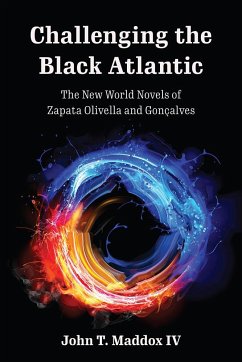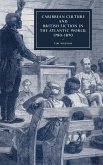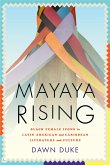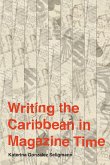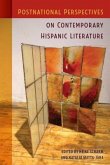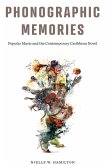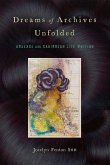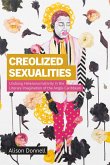Schade – dieser Artikel ist leider ausverkauft. Sobald wir wissen, ob und wann der Artikel wieder verfügbar ist, informieren wir Sie an dieser Stelle.
- Gebundenes Buch
- Merkliste
- Auf die Merkliste
- Bewerten Bewerten
- Teilen
- Produkt teilen
- Produkterinnerung
- Produkterinnerung
This incisive new study demonstrates how Columbian writer Manuel Zapata Olivella’s novel Changó el gran putas (1983) and Brazilian-born Ana Maria Gonçalves’ saga Um defeito de cor (2006) transcend Paul Gilroy’s paradigm of the Black Atlantic to show revolutions, communities, and femininities that prophesy a just “New World.”
Andere Kunden interessierten sich auch für
![Caribbean Culture and British Fiction in the Atlantic World, 1780-1870 Caribbean Culture and British Fiction in the Atlantic World, 1780-1870]() Tim WatsonCaribbean Culture and British Fiction in the Atlantic World, 1780-1870104,99 €
Tim WatsonCaribbean Culture and British Fiction in the Atlantic World, 1780-1870104,99 €![Mayaya Rising Mayaya Rising]() Dawn DukeMayaya Rising163,99 €
Dawn DukeMayaya Rising163,99 €![Writing the Caribbean in Magazine Time Writing the Caribbean in Magazine Time]() Katerina Gonzalez SeligmannWriting the Caribbean in Magazine Time157,99 €
Katerina Gonzalez SeligmannWriting the Caribbean in Magazine Time157,99 €![Postnational Perspectives on Contemporary Hispanic Literature Postnational Perspectives on Contemporary Hispanic Literature]() Postnational Perspectives on Contemporary Hispanic Literature80,99 €
Postnational Perspectives on Contemporary Hispanic Literature80,99 €![Phonographic Memories Phonographic Memories]() Njelle W HamiltonPhonographic Memories164,99 €
Njelle W HamiltonPhonographic Memories164,99 €![Dreams of Archives Unfolded Dreams of Archives Unfolded]() Jocelyn Fenton StittDreams of Archives Unfolded157,99 €
Jocelyn Fenton StittDreams of Archives Unfolded157,99 €![Creolized Sexualities Creolized Sexualities]() Alison DonnellCreolized Sexualities157,99 €
Alison DonnellCreolized Sexualities157,99 €
This incisive new study demonstrates how Columbian writer Manuel Zapata Olivella’s novel Changó el gran putas (1983) and Brazilian-born Ana Maria Gonçalves’ saga Um defeito de cor (2006) transcend Paul Gilroy’s paradigm of the Black Atlantic to show revolutions, communities, and femininities that prophesy a just “New World.”
Produktdetails
- Produktdetails
- Verlag: Bucknell University Press
- Seitenzahl: 350
- Erscheinungstermin: 16. Oktober 2020
- Englisch
- Abmessung: 231mm x 157mm x 23mm
- Gewicht: 612g
- ISBN-13: 9781684481873
- ISBN-10: 1684481872
- Artikelnr.: 58667572
- Herstellerkennzeichnung
- Libri GmbH
- Europaallee 1
- 36244 Bad Hersfeld
- gpsr@libri.de
- Verlag: Bucknell University Press
- Seitenzahl: 350
- Erscheinungstermin: 16. Oktober 2020
- Englisch
- Abmessung: 231mm x 157mm x 23mm
- Gewicht: 612g
- ISBN-13: 9781684481873
- ISBN-10: 1684481872
- Artikelnr.: 58667572
- Herstellerkennzeichnung
- Libri GmbH
- Europaallee 1
- 36244 Bad Hersfeld
- gpsr@libri.de
JOHN T. MADDOX IV is an assistant professor of Spanish and African American studies at the University of Alabama at Birmingham.
Introduction: This Book, Manuel Zapata Olivella, and Ana Maria Gonçalves
a Manuel Zapata Olivella (1920-2004)
b Zapataolivellismo
i The U.S. Context
ii The Latin American Context
c Ana Maria Gonçalves (b.1970)
d The Bourgeoning Criticism on Ana Maria Gonçalves
e Changó and Defeito: Summaries
i Changó el gran putas (1983)
ii Um defeito de cor (2006)
1 Myth, Literature, and History in Zapata
a Muntu, Nuevo Muntu, and Changó's Curse
i Influences
ii Placide Tempels and the Muntu
iii The Curse
b The Origin Myth of Benkos Bioho
2 Afro-Brazil in Defeito and Changó
a Luís Gama: History, Myth, and Literature
b Luísa Mahin: From Poetry to History
c Quilombos in Changó
i Aleijadinho and Zumbi
d Quilombos and Terreiros of Defeito
i Gender and Myth in Dahomey
e Conclusion
3 Double Consciousness and Nation in Gilroy and Zapata
a The Black Atlantic and the Nuevo Muntu
i The Black Atlantic: Summary
ii After The Black Atlantic
iii Representative Critics of Gilroy in the Anglophone
Tradition
b Du Bois in Changó
i Zapata's Du Bois
ii Double Consciousness
iii Music, Orality, and the Sea
iv The African Diaspora is part of a New World History beyond the Nation
c. Zapata, Precursor of Today's Latin Americanist Critics of Gilroy
4 Women, Gender, and the Nuevo Muntu
a The Black Atlantic from an Afro-Brasileira's Point of View
i. Domingos Álvares and the Black Atlantic Kingdom of Dahomey
ii. Gonçalves and Antônio Olinto's Black Atlantic
iii. Luís Gama's Brazil in the Black Atlantic
b Rape in the Novels of Zapata and Gonçalves
i. Sons of God and the She-Devil
ii. Mother Africa
iii. Gonçalves's Raw Realism of Rape
c Changó / Santa Bárbara and Queer Characters
d Agne Brown and the Apocalypse
Conclusion: The Nuevo Muntu Today and Tomorrow
a El Putas, U.S.A.
b Nuevo Muntu History and Gonçalves's Journalism
c Afrofuturism
i Brazil
ii Latinx-futurism
iii Ana Maria Gonçalves
Acknowledgments
Bibliography
a Manuel Zapata Olivella (1920-2004)
b Zapataolivellismo
i The U.S. Context
ii The Latin American Context
c Ana Maria Gonçalves (b.1970)
d The Bourgeoning Criticism on Ana Maria Gonçalves
e Changó and Defeito: Summaries
i Changó el gran putas (1983)
ii Um defeito de cor (2006)
1 Myth, Literature, and History in Zapata
a Muntu, Nuevo Muntu, and Changó's Curse
i Influences
ii Placide Tempels and the Muntu
iii The Curse
b The Origin Myth of Benkos Bioho
2 Afro-Brazil in Defeito and Changó
a Luís Gama: History, Myth, and Literature
b Luísa Mahin: From Poetry to History
c Quilombos in Changó
i Aleijadinho and Zumbi
d Quilombos and Terreiros of Defeito
i Gender and Myth in Dahomey
e Conclusion
3 Double Consciousness and Nation in Gilroy and Zapata
a The Black Atlantic and the Nuevo Muntu
i The Black Atlantic: Summary
ii After The Black Atlantic
iii Representative Critics of Gilroy in the Anglophone
Tradition
b Du Bois in Changó
i Zapata's Du Bois
ii Double Consciousness
iii Music, Orality, and the Sea
iv The African Diaspora is part of a New World History beyond the Nation
c. Zapata, Precursor of Today's Latin Americanist Critics of Gilroy
4 Women, Gender, and the Nuevo Muntu
a The Black Atlantic from an Afro-Brasileira's Point of View
i. Domingos Álvares and the Black Atlantic Kingdom of Dahomey
ii. Gonçalves and Antônio Olinto's Black Atlantic
iii. Luís Gama's Brazil in the Black Atlantic
b Rape in the Novels of Zapata and Gonçalves
i. Sons of God and the She-Devil
ii. Mother Africa
iii. Gonçalves's Raw Realism of Rape
c Changó / Santa Bárbara and Queer Characters
d Agne Brown and the Apocalypse
Conclusion: The Nuevo Muntu Today and Tomorrow
a El Putas, U.S.A.
b Nuevo Muntu History and Gonçalves's Journalism
c Afrofuturism
i Brazil
ii Latinx-futurism
iii Ana Maria Gonçalves
Acknowledgments
Bibliography
Introduction: This Book, Manuel Zapata Olivella, and Ana Maria Gonçalves
a Manuel Zapata Olivella (1920-2004)
b Zapataolivellismo
i The U.S. Context
ii The Latin American Context
c Ana Maria Gonçalves (b.1970)
d The Bourgeoning Criticism on Ana Maria Gonçalves
e Changó and Defeito: Summaries
i Changó el gran putas (1983)
ii Um defeito de cor (2006)
1 Myth, Literature, and History in Zapata
a Muntu, Nuevo Muntu, and Changó's Curse
i Influences
ii Placide Tempels and the Muntu
iii The Curse
b The Origin Myth of Benkos Bioho
2 Afro-Brazil in Defeito and Changó
a Luís Gama: History, Myth, and Literature
b Luísa Mahin: From Poetry to History
c Quilombos in Changó
i Aleijadinho and Zumbi
d Quilombos and Terreiros of Defeito
i Gender and Myth in Dahomey
e Conclusion
3 Double Consciousness and Nation in Gilroy and Zapata
a The Black Atlantic and the Nuevo Muntu
i The Black Atlantic: Summary
ii After The Black Atlantic
iii Representative Critics of Gilroy in the Anglophone
Tradition
b Du Bois in Changó
i Zapata's Du Bois
ii Double Consciousness
iii Music, Orality, and the Sea
iv The African Diaspora is part of a New World History beyond the Nation
c. Zapata, Precursor of Today's Latin Americanist Critics of Gilroy
4 Women, Gender, and the Nuevo Muntu
a The Black Atlantic from an Afro-Brasileira's Point of View
i. Domingos Álvares and the Black Atlantic Kingdom of Dahomey
ii. Gonçalves and Antônio Olinto's Black Atlantic
iii. Luís Gama's Brazil in the Black Atlantic
b Rape in the Novels of Zapata and Gonçalves
i. Sons of God and the She-Devil
ii. Mother Africa
iii. Gonçalves's Raw Realism of Rape
c Changó / Santa Bárbara and Queer Characters
d Agne Brown and the Apocalypse
Conclusion: The Nuevo Muntu Today and Tomorrow
a El Putas, U.S.A.
b Nuevo Muntu History and Gonçalves's Journalism
c Afrofuturism
i Brazil
ii Latinx-futurism
iii Ana Maria Gonçalves
Acknowledgments
Bibliography
a Manuel Zapata Olivella (1920-2004)
b Zapataolivellismo
i The U.S. Context
ii The Latin American Context
c Ana Maria Gonçalves (b.1970)
d The Bourgeoning Criticism on Ana Maria Gonçalves
e Changó and Defeito: Summaries
i Changó el gran putas (1983)
ii Um defeito de cor (2006)
1 Myth, Literature, and History in Zapata
a Muntu, Nuevo Muntu, and Changó's Curse
i Influences
ii Placide Tempels and the Muntu
iii The Curse
b The Origin Myth of Benkos Bioho
2 Afro-Brazil in Defeito and Changó
a Luís Gama: History, Myth, and Literature
b Luísa Mahin: From Poetry to History
c Quilombos in Changó
i Aleijadinho and Zumbi
d Quilombos and Terreiros of Defeito
i Gender and Myth in Dahomey
e Conclusion
3 Double Consciousness and Nation in Gilroy and Zapata
a The Black Atlantic and the Nuevo Muntu
i The Black Atlantic: Summary
ii After The Black Atlantic
iii Representative Critics of Gilroy in the Anglophone
Tradition
b Du Bois in Changó
i Zapata's Du Bois
ii Double Consciousness
iii Music, Orality, and the Sea
iv The African Diaspora is part of a New World History beyond the Nation
c. Zapata, Precursor of Today's Latin Americanist Critics of Gilroy
4 Women, Gender, and the Nuevo Muntu
a The Black Atlantic from an Afro-Brasileira's Point of View
i. Domingos Álvares and the Black Atlantic Kingdom of Dahomey
ii. Gonçalves and Antônio Olinto's Black Atlantic
iii. Luís Gama's Brazil in the Black Atlantic
b Rape in the Novels of Zapata and Gonçalves
i. Sons of God and the She-Devil
ii. Mother Africa
iii. Gonçalves's Raw Realism of Rape
c Changó / Santa Bárbara and Queer Characters
d Agne Brown and the Apocalypse
Conclusion: The Nuevo Muntu Today and Tomorrow
a El Putas, U.S.A.
b Nuevo Muntu History and Gonçalves's Journalism
c Afrofuturism
i Brazil
ii Latinx-futurism
iii Ana Maria Gonçalves
Acknowledgments
Bibliography

